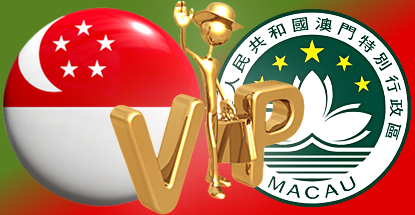 Macau casinos’ VIP gaming market fell over 45% in March and junket operators say April isn’t looking any better.
Macau casinos’ VIP gaming market fell over 45% in March and junket operators say April isn’t looking any better.
Official numbers from Macau gaming regulators aren’t due for another couple weeks, but Deutsche Bank analysts believe the VIP market fell 45.4% year-on-year in March, well above the 39% decline in overall gaming revenue. VIP turnover was reportedly off an even more alarming 54.2%.
Mass market gaming revenue was believed to be down a modest 29.4% and slots were off 24.4% from March 2014. Sands China’s mass market decline was one point worse than the overall mass decline, while Wynn Macau boasted a mass decline of just 4.7%.
Macau earned MOP 21.5b (US $2.7b) in gaming revenue in March, but early projections are that April will come in lower. An informal polling of some casino junket operators by Macao Daily put April’s expected revenue total at no better than MOP 20b. One junket operator suggested the VIP market wouldn’t recover until (a) Beijing slowed the corruption crackdown train and (b) the mainland’s economy picked up.
In March, Beijing suggested its annual growth target would be the lowest in 15 years. The stalled economy has made real estate a buyer’s market, leaving many VIPs with no easy means of raising cash to go gambling. It’s also preventing VIPs from honoring existing gambling debts – which can rise to mid-nine-figure levels – putting even more pressure on junket operators already struggling from a liquidity crunch.
A similar problem is plaguing Singapore’s two integrated resorts, although the situation has a local twist. There are only three junkets approved to operate in Singapore compared with around a couple hundred in Macau. That puts the responsibility for collecting most gambling debts squarely with the casinos, which lack the junkets’ mainland connections and/or willingness to play hardball.
Singapore’s casinos filed 49 gambling deadbeat lawsuits in local courts in 2014 – up from just two in 2013 – and a dozen more in Q1 2015. In February, Genting Singapore reported a 42% increase in the annual volume of bad debts its Resorts World Sentosa (RWS) property had given up trying to collect. Union Gaming analyst Grant Govertsen told Bloomberg that Genting Singapore’s total unpaid markers last year was over $787m, more than twice the debts incurred in 2010, the year RWS opened.
RWS has deals with all three licensed junkets while crosstown rival Marina Bay Sands has avoided junkets altogether. This is a similar philosophy Sands China employs in Macau, where it is said to lead all casino concessionaires in direct dealings with VIP gamblers. Cutting out the junket middlemen is a potentially lucrative strategy, provided the VIP is ready and willing to pay his losses.






